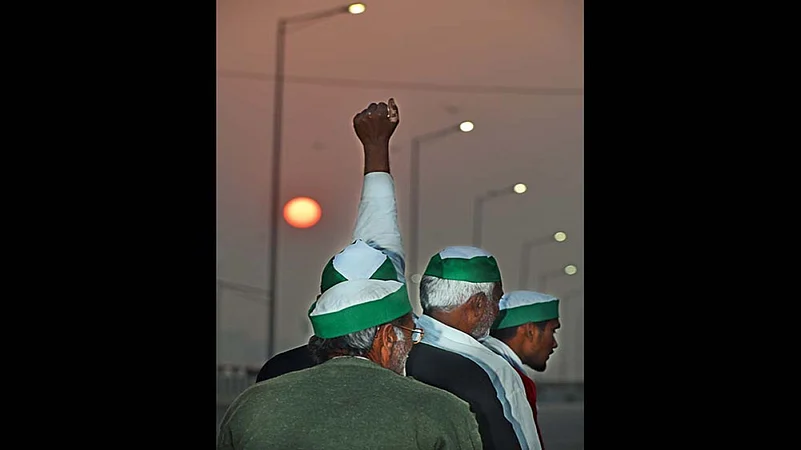The still brewing farmers’ protest is arguably the biggest challenge that the Narendra Modi-led government has faced in its seventh year in power. The usually self-assured BJP top-brass appears to be floundering in the face of persistent protests, which have already made the government climb down from its original, uncompromising stand.
After six rounds of talks—starting from secretary- to group of ministers-level and finally with Union home minister Amit Shah—there has been no breakthrough. While the government has offered concessions, the intransigent farmers are insisting on nothing less than a repeal of the three farm laws.
ALSO READ: Maximum Support Protest
Sources in the government claim that rolling back the laws is not possible. “We have already conceded much more than what we were willing to. Even the farmers have to soften their stand and meet us somewhere in the middle,” says a party general secretary. The government is not willing to face the embarrassment that it faced when Prime Minister Modi, in his 15th month in power, announced the decision to withdraw the equally contentious land acquisition ordinance.
During his Mann ki Baat broadcast on August 30, 2015, Modi said that the “farmers were being misled and a fear psychosis created”—an argument similar to that being put forth now for the farm laws. “For me, every single voice in the nation is important but most important to me is the voice of the farmer. We had issued an ordinance. Tomorrow, on August 31st the deadline for this ordinance ends. I have decided to let this ordinance lapse,” he had said. The retreat was seen as one of the biggest embarrassments for the Modi government.
ALSO READ: ‘New Laws Not Related To MSP’
So, another tactical retreat is not an option for the government, now seen to be stronger than ever. “The government has already lost a lot because of the farm laws. Its oldest ally Shiromani Akali Dal (SAD) walked out. Its leader Parkash Singh Badal returned the Padma Vibhushan. The BJP, now preparing to contest the 2022 Punjab assembly elections alone, may play it down, but its image is taking a beating,” concedes a senior party leader.
While the party’s prospects in Punjab may be bleak, its government in Haryana is also hanging by a thread. Dushyant Chautala, leader of the Jannayak Janata Party (JJP), is under pressure to withdraw support to the Manohar Lal Khattar government and back the protesting farmers. “Khattar, too, is facing the heat from party leaders. He had assured the central leadership that not a single farmer would join the protest. He is increasingly seen as a liability,” says a senior BJP leader from Haryana.
Khattar’s attempt at invoking the ‘Khalistani’ bogey also backfired. “The Khalistan slur had the support of the central leadership too. It was believed that it will divide the movement, isolate farmers from Punjab—the majority of protestors—and delegitimise the protests. But it only served to anger the farmers and harden their stand even more,” adds the leader.
ALSO READ: Minimum Support, Maximum Mileage
It is now evident that the Modi government was ill-prepared to tackle the farmer protests and may have underestimated them. “Initially we may have miscalculated both their resolve and organisational ability. We doubted they will ever reach the capital,” admits the party general secretary.
Ashutosh Kumar, chairperson of the department of political science at Panjab University, believes that the government did not anticipate the kind of mobilisation that happened, including from Haryana. “Punjab has been the worst affected. The industries have moved out to Baddi (in Himachal Pradesh). No new investments are coming into the state. The Green Revolution has run its course. The state is mostly dependent on agriculture. The government completely misread the situation. They thought they will get away by pushing the laws like they did for demonetisation and GST,” he tells Outlook.
ALSO READ: Sow Only After Preparing Soil
Experts believe that the government’s calculation would have been to push in the farm bills during the COVID-19 crisis, much like how then PM Narasimha Rao brought in the economic reforms in 1991. “First, the government brought the pro-market farm laws through the ordinance route and then pushed them without following due process of consultation. In a democracy, if the government has to bring in hard reforms that have a direct and visible impact on so many people, especially if the impact is seen as adverse by the people who have the ability to organise themselves, then the government better be careful,” explains Kumar.
According to him, the government lacks leaders who have knowledge about Punjab, its problems and its people. “There was Arun Jaitley, who probably knew something about the state. Punjab is different from states like Chhattisgarh and Bihar, with all due respect to them. Same methods and policies cannot work with the people of the state. The government perhaps did not expect the kind of solidarity that has been displayed by farmers and their supporters,” he adds.

Farmer union leaders after talks with the government.
Surinder Singh Jodhka, professor at JNU’s Centre for the Study of Social Systems, says the muscular, intensifying response from the farmers is the first big mobilisation after their legendary uprising in 1984, when Punjab’s Raj Bhavan was gheraoed for several weeks. Nearly 40,000 farmers laid siege to the governor’s residence, protesting excessive power supply rates for their largely mechanised farms, combined with unremunerative prices for their produce. The government was forced to yield to their determination. While Jodhka believes that agriculture reforms are essential, the government needed to coordinate with other states, especially since agriculture is on the Concurrent List, and also followed due consultative process. “It is understandable that the government wants to get rid of the subsidy but it cannot do so in a hurry. Everything should have been done beforehand to convince farmers that their interests would be protected. Reforms should be empowering and the farmers need to believe so,” he tells Outlook.
Farmer unions like the Bharatiya Kisan Union (BKU) are apolitical and have been working for decades. “I have seen Balbir Singh Rajewal (president of BKU) for many years now. The farmers’ leaders are shrewd and intelligent. The government may very well have realised that they cannot be taken for fools or a rift created to divide them,” the JNU professor says.
While the farmers have kept a united front, there are different voices emerging from within the government. Even when the Bills were rushed through Rajya Sabha, there were many within the BJP who believed that it wasn’t the right way of introducing reforms. “The PM and the home minister did not foresee this big a roadblock. They thought there would be some protests, but then the laws will be accepted. They never imagined that protesting farmers would manage to encircle the capital and not budge,” reveals a senior BJP leader.
Minister of state for commerce and industry Som Parkash is one of the three leaders, along with senior colleague Piyush Goyal and agriculture minister Narendra Singh Tomar, who have been talking with the farmers. He says that “all these things (the protests) do not benefit the country. In a democracy, things can be resolved only through dialogue.” Parkash admits that talks with the farmers have not been easy. “They need to show some flexibility,” he says.
Minister for law and justice Ravi Shankar Prasad accuses the Opposition, especially the Congress, of “shameful double standards.” While he desists from accusing the Opposition of fuelling the protests, he says that non-BJP parties have jumped on to the bandwagon of farmer protest for political gain. “The repeal of the APMC Act was part of the 2019 manifesto of the Congress. Why the double standards now?” he asks.
CPI(M) leader Sitaram Yechury, who was part of the Opposition delegation that met President Ramnath Kovind on December 9, says they appealed to him as he is the custodian of the Constitution. “The way the farm laws were passed was anti-democratic. The government did not heed to our request for proper consultation and debate. These issues were flagged in Parliament. Had they been addressed there, they wouldn’t have spilled onto the streets,” he says.
While the government is adamantine about not giving in to the protesting farmers, it is hoping for exhaustion on their side to set in, something that will force them to climb down from their “repeal the laws” position. In the meantime, it has decided to continue with its campaign of educating the farmers about the benefits of the new farm laws.


























